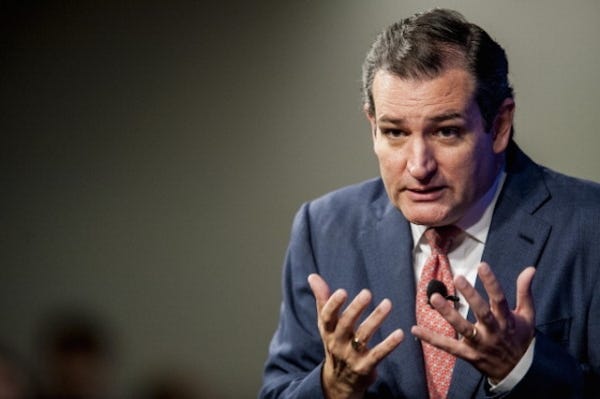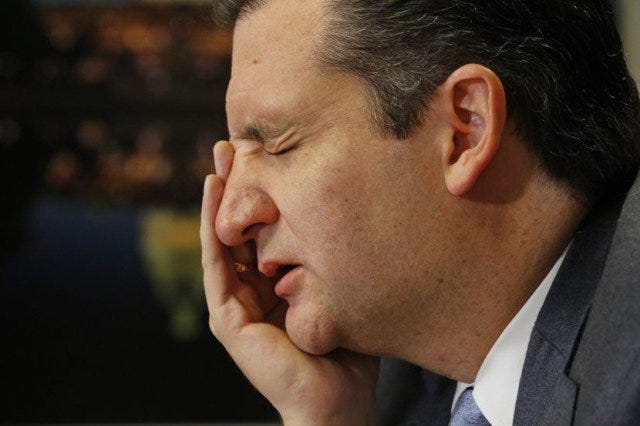Ted Cruz and the Establishment: Unrequited Love
Ted Cruz isn’t anti-establishment. His entire campaign has been driven by the need to be the establishment.
[T]ed Cruz’s candidacy has been built on his outsider persona. The Texan has used his credentials as a political troublemaker to climb the ladder of political power in the GOP. Now that he’s within reach of the presidency, though, Cruz has quieted talk about his anti-establishment leanings and accepted the endorsements and accolades- given grudgingly- of his political peers.
One might look at this change in political positioning as the movement of a political partisan seeing the possibility of more power for his political positions. One might see it as necessary for a political outsider to cater, at least a little bit, to the party’s ruling class to obtain the nomination. One would be wrong.
When you consider Cruz’s background, it all makes sense. There’s the high school student talking about how he wants to “take over the world:”
There’s the young law student who refused to even study with students from “minor Ivies:”
The elite academic circles that Cruz was now traveling in began to rub off. As a law student at Harvard, he refused to study with anyone who hadn’t been an undergrad at Harvard, Princeton, or Yale. Says Damon Watson, one of Cruz’s law-school roommates: “He said he didn’t want anybody from ‘minor Ivies’ like Penn or Brown.”
And then there’s the man who fought for Bush. Politico’s revealing article from January, “When Ted Cruz Wanted to be Part of the Establishment,” highlights this interview with former Bush Press Secretary Ari Fleischer where all of Cruz’s positives and negatives are on display:
Ari Fleischer, who would go on to become White House press secretary, called himself “one of the few people in Bush world who likes” Cruz. “I always found Ted to be affable, self-deprecating, smart and enjoyable to be around,” Fleischer said. But he still said that Cruz had carved out a debilitating reputation for himself internally.
“Ted saw the bright lights of the White House and wanted them to shine on him,” Fleischer said. “He was young, extremely smart and ambitious, and he wasn’t the first and won’t be the last to misplay his cards and try to walk into that building. And in an environment where teamwork and modesty was prized, Ted didn’t fit that mold.”
[C]ruz was snubbed after tirelessly working for one of the most elitist and establishment candidates in recent memory, George W. Bush. As I pointed out in January:
Ted’s public life has been all about power at the expense of relationships. His tireless campaigning as a policy adviser for Bush in 2000 netted him a position as associate deputy attorney general. Shortly thereafter he was shuffled into the Federal Trade Commission. It was a placement that was seen as a slight, but necessary because by that point nobody in the Bush White House could stand him.
Cruz’s career having stalled out, he slunk back to Texas:
Cruz left the Bush administration went back to his home state of Texas, serving as Solicitor General in the Rick Perry administration from 2003 until 2008. He then went into private practice and lurked in the background, waiting for his moment. It came four years later.
The Tea Party moment provided Cruz with the opportunity to seize power at the expense of the Republican establishment that had scorned him:
In 2012, he won the primary for US Senate in an upset, relying on Tea Party backing to steal the nomination from sitting Lieutenant Governor David Dewhurst. The out of nowhere rise to power would set the tone for his Senate career.
Not bad for a man who had seen his dreams of a high level White House appointment dashed by virtue of his repellent personality.
[A]nd now it has all come to fruition. Cruz is the only hope left to stop Donald Trump from attaining the Republican nomination. In order for Trump to be stopped, Cruz must win at least some of the remaining contests. In order for Cruz to win, he needs the backing of establishment Republicans.
That’s backing they’re… not crazy about giving.
Mitt Romney implored voters to vote for Cruz in Utah- but refused to endorse the Texan.
Lindsey Graham endorsed Cruz- but struggled to find a kind word to say about the Senator.
Joe Scarborough outright denied the possibility of a Cruz general election candidacy, saying that “It’s going to be Trump or somebody else…[Cruz] is loathed in Washington. He is not going to do it. It’s going to be Trump or somebody else.”
Scarborough is probably right. There will most likely be a white knight that rides in at the last moment to save the party from Cruz or Trump. But for now, the Republicans are left with a true dilemma:
Do they pick Trump?
Or do they pick Cruz?
[spacer height=”20px”]




